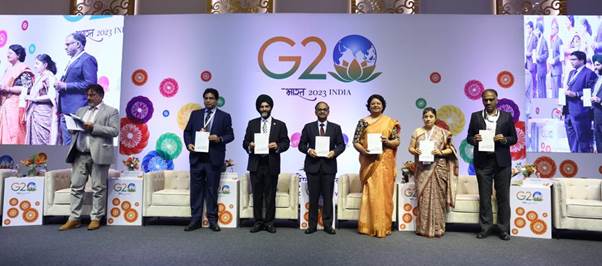
As part of the third Energy Transition Working Group (ETWG) meeting of India’s G20 Presidency, the Ministry of New and Renewable Energy (MNRE), together with the Indian Renewable Energy Development Agency (IREDA), and International Renewable Energy Agency (IRENA) hosted the official side event, ‘Low-cost Finance for New & Emerging Energy Technologies’ in Mumbai today. The event brought together policy makers, financial institutions and technology developers to deliberate on the estimation of cost-effective financing for energy transition based on the future trajectory of emerging critical technologies – Hydrogen, Offshore Wind, Energy Storage and Carbon Capture Utilization & Storage (CCUS). Low-cost financing is identified as one of the six key priority areas established by the Energy Transition Working Group (ETWG) under India’s Presidency.
The report “Low-Cost Finance for Energy Transition” prepared by IRENA in collaboration with the MNRE under G20’s India Presidency, was unveiled at the G20 ETWG side event. The report provides a comprehensive toolbox to increase the availability of low-cost capital in G20 countries and beyond.

Additionally, two reports developed by the Ministry of Power, in collaboration with the Indian Institute of Management, Ahmadabad and NTPC NETRA titled “Financing Needs for New Age Critical Technologies: CO2 Capture Utilization and Storage (CCUS)” and “Financing Needs for New Age Critical Technologies: Battery Energy Storage (BES)” were unveiled at the side event.
Mr. Pradip Kumar Das, Chairman & Managing Director, IREDA welcomed the distinguished delegates and guests to the ETWG side-event. Mr. Sunil Nair, Chief General Manager, Reserve Bank of India and Ms. Abha Shukla, Principal Secretary Energy, Government of Maharashtra delivered the Special Address.
Mr Bhupinder Singh Bhalla, Secretary, Ministry of New and Renewable Energy (MNRE), Government of India in his Inaugural Address said, “The energy transition is a technically feasible and economically viable option, and its benefits significantly outweigh its costs. India, through the Presidency of the G20, is committed to an accelerated, responsible and just energy transition through international cooperation and collaboration.”
Mr. Alok Kumar, Secretary, Ministry of Power, in his Keynote Address said, “India stands ready to work towards harnessing the immense opportunities that the energy transition presents to us today with the G20 countries and beyond.”
“The global energy transition requires a rapid scale-up of renewable energy deployment globally, making access to low-cost finance urgently vital,” said IRENA Deputy Director-General Ms. Gauri Singh.
Dr. Roland Roesch, Director, IITC, IRENA delivered the scene setting presentation and stated, “Solar and wind power offer a case study in the importance of coordinated policies to spur deployment, technology innovation and supply chain growth, and the importance of low-cost finance in driving the deployment of the critical energy transition technologies – such as – green hydrogen, offshore wind, and energy storage.”
There were two panel discussions moderated by Ms. Gauri Singh, Deputy Director-General, IRENA and Mr. Dan Dorner, Head of the Strategic Initiatives Office, International Energy Agency (IEA) respectively. Representatives from IIT Bombay, Equinor, JSW Group, Reliance New Energy, Exim Bank, Asian Development Bank, NIIF, Power Finance Corporation (PFC) and the Climate Envoy from Denmark participated in the panel discussions.
The first panel on “outlook of new and emerging energy technologies” focused on deliberating on the estimation of low-cost finance for energy transitions based on the future trajectory of emerging technologies, the rate and scale of deployment, and inclusiveness of the transition. The second panel discussion on the theme “The role of International Financial Institutions (IFIs) and Multilateral Development Banks (MDBs) in mobilising investments” highlighted the role played by the public sector as a catalyzer in setting the right ecosystem to reduce the cost of capital and attract private investment, and the innovative financing schemes that can facilitate the process.
The closing remarks were delivered by Mr Dinesh D Jagdale, Joint Secretary, Ministry of New and Renewable Energy, who thanked the esteemed guests and panelists for the engaging discussions on the way forward towards financing a sustainable and robust energy transition.
*****
AM/

